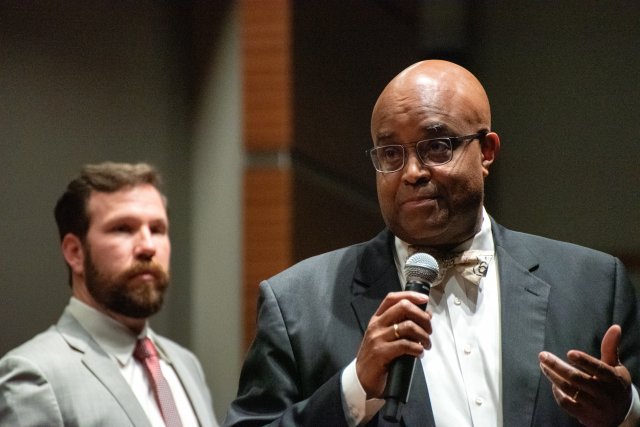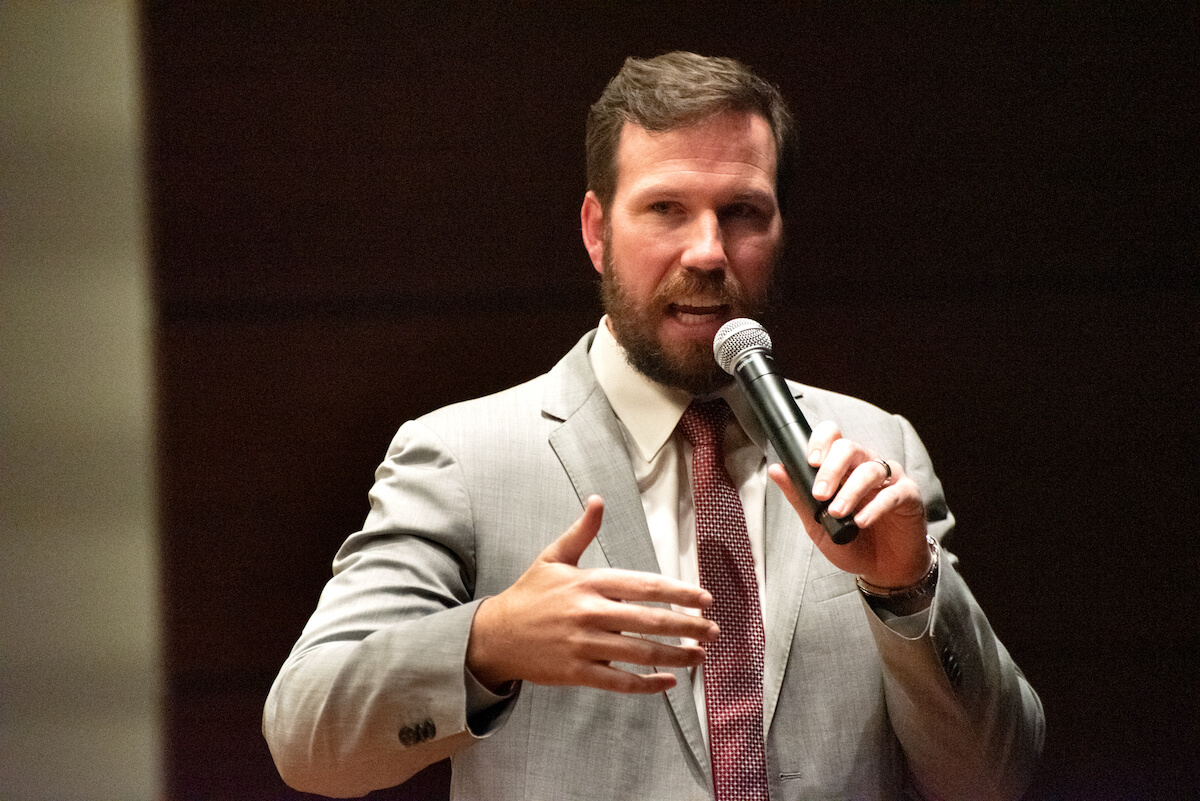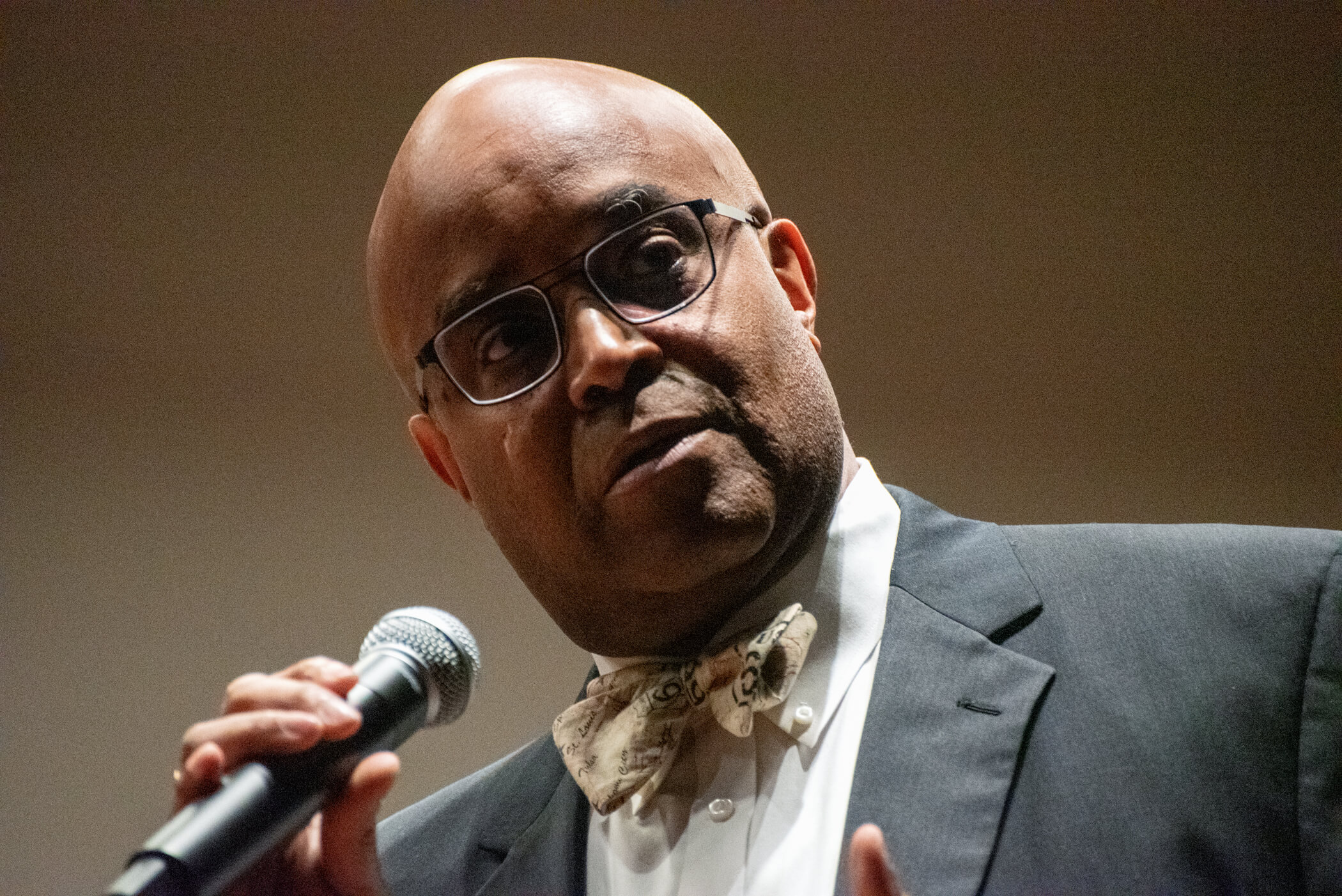
While Edmond mayoral candidates Darrell Davis and Nathan Walters disagreed about mask mandates in a 60-minute debate tonight at the University of Central Oklahoma, neither took a strong position on two controversial multifamily residential development proposals.
In addition, the candidates discussed how to handle Edmond’s east-side development and body-worn cameras for police. Wednesday night’s debate was hosted by NonDoc, News 9 and UCentral Media, and full video of the debate can be viewed on News9.com or at the bottom of this article on Facebook.
Voters will decide April 6 whether Davis or Walters will become Edmond’s next mayor. Davis currently serves as the city’s Ward 3 councilman and has lived in Edmond for three decades, while Walters is a local homebuilder who graduated from the University of Central Oklahoma.
Edmond voters will also elect two other City Council positions April 6, as well as an Edmond Public Schools Board seat and State Senate District 22, which covers a portion of west Edmond.
Candidates avoid stances on multifamily housing proposals

Earlier this month, the Edmond City Planning Commission advanced two multifamily housing development applications that have spurred controversy, including one that would feature up to 300 units near 15th Street and Bryant Avenue south of Hafer Park, which some fear will be negatively impacted. The other proposal sits at I-35 and 33rd Street and has drawn criticism regarding density and traffic.
Edmond’s City Council was scheduled to hear one of the rezoning applications Monday, but the item was tabled. Davis said Wednesday that he was not prepared to say how he will vote when the actual votes happen, a policy he said he has maintained during his nine years on the council. But he said affordable housing options in Edmond would be beneficial.
“There is a need for multifamily in any town,” Davis said. “Why? You have to look at the workforce that you have in your town. A lot of people who work in Edmond don’t live in Edmond. How do you bring those people in? You have to have some place for them to live. All of them aren’t multifamily. Some are single units. I will evaluate them on the impact they will have to the community and the surrounding neighborhood.”
Walters said he understands concerns about traffic congestion, which is why he said the developments need to be paired with long-term planning.
“We’re primarily a commuter college,” he said of UCO. “I know this because I commuted to college, and I also lived in an apartment, and without apartments I wouldn’t have been able to afford to do so. I do understand that 15th and Bryant is congested. (…) That’s why I go into the planning stage. When you’re looking at planning, you’re looking at long-term plans. If you’re going to have multifamily, you probably need to make sure there are biking trails and walking trails so residents can bike and walk to grocery stores, so we’re getting exercise and we’re reducing traffic.”
Walters said he would likely vote to approve the developments if those involved are meeting zoning requirements.
“I don’t see how government can infringe on those rights,” he said.
Body camera delays discussed

Edmond’s police department began its effort to equip all of its officers with body cameras in 2016. In 2019, three years after the project began, officers who were not wearing body cameras fatally shot 17-year-old Isaiah Lewis.
In January, the Edmond City Council voted to purchase enough cameras to fully equip the city’s officers by May. But asked what he would tell residents who were frustrated by the past delays, Davis, who voted to purchase the cameras, said he did not know why there was a delay in fully rolling out the program.
“What I would tell the community is the why of why that happened,” he said. “I don’t have a specific reason today, but I could easily research and find out what they are. We need to tell the community that we started the program, and now we’ve completed it. Sometimes we start an initial plan, and it doesn’t come out exactly the way you want it to, but it’s essential we tell the community why. The good thing is all of our patrol officers will have body cameras.”
Walters said that when projects encounter problems, making sure the public knows is critical.
“The mayor is the face (of the community),” he said. “It’s being able to get out and explain any of these issues that we have frustrations with with our constituents. I understand it’s easier said than done. But one of the reasons I’m running (on) is that, as an entrepreneur, we have to get things done or people will start going elsewhere. Body cameras is such an easy thing for everyone to agree on, but then on the back end, how do we get that done? We have to push things through.”
Follow @NonDocMedia on:
Candidates differ on masks
While Walters and Davis agreed on many issues, masks and their role in reducing the spread of the novel coronavirus that has killed nearly 560,000 Americans was not one of them.
Davis voted for Edmond’s mask ordinance — which expired this week — multiple times as a councilmember, a decision he said was backed by science and guidance from public health officials.
“I was listening to the medical community that we listened to before on many other issues, and they were saying that we needed to wear masks,” Davis said. “I am concerned for our first responders that are out there. Our police and fire. The medical community. Our teachers that are out there. Those are my concerns. So yes, I do stand by initial votes that I’ve had over the pandemic.”
Walters said he doesn’t favor mask ordinances because it is a personal freedom issue.
“I’m running on a stance that my number one belief is that the function of government is to protect the individual’s God-given rights through the Constitution,” he said. “I’m a big believer that we’re in a community, that you present this option to the business owners and the citizens. And we had that for a whole, and then we went into a mandate.”
Walters added that he wouldn’t have required masks in city buildings as mayor. When asked if he believes masks help to curb the spread of the virus, he said he doesn’t know.
“I’m not exactly sure. I’m not a doctor,” Walters said. “I stay out of the scientific side of it. I feel like politicians have crossed over as doctors, and I feel like doctors have become politicians. Science is ever-evolving (…) I just don’t know. I don’t follow it that much. My issue with it was never a science issue, it was a liberty issue.”
The CDC and the World Health Organization both have said masks help prevent the spread of the virus. A study by Yale University last year found that weekly increases in per-capita mortality were four times lower in places where masks were the norm or recommended by the government compared to other regions where masks were not encouraged or required.
Walters to report campaign finances
While Walters has not yet filed campaign finance reports according to the city clerk’s office, the candidate said after Wednesday’s debate that he had not spent or raised money in the previous cycle, but that he will file a report in the next cycle.
“We didn’t start fundraising or spending money until after the primaries,” Walters said. “We didn’t have anything to [report].”
Watch the debate between Edmond mayoral candidates
Other questions in Wednesday’s debate concerned the city budget, racism, medical marijuana and whether the candidates believe Edmond needs to consider tax increases to fund city services in coming years. Both said they believe additional revenues will be needed.
To watch the full debate, click play on the Facebook embed below or visit News9.com.




















